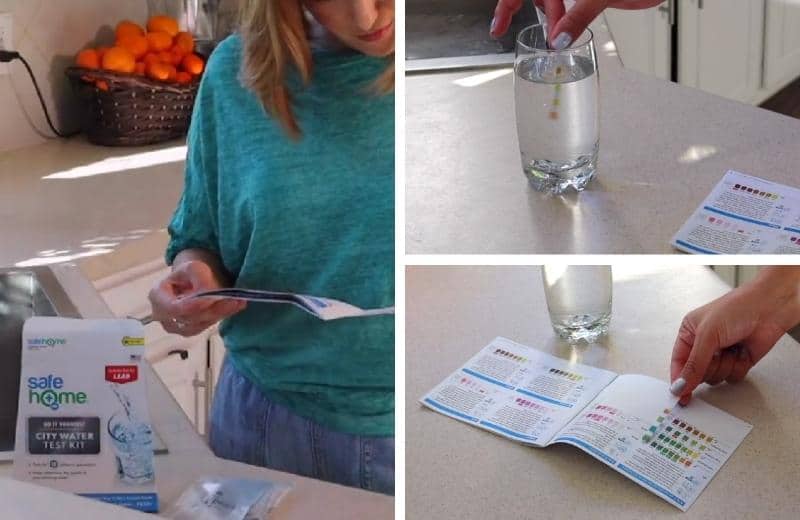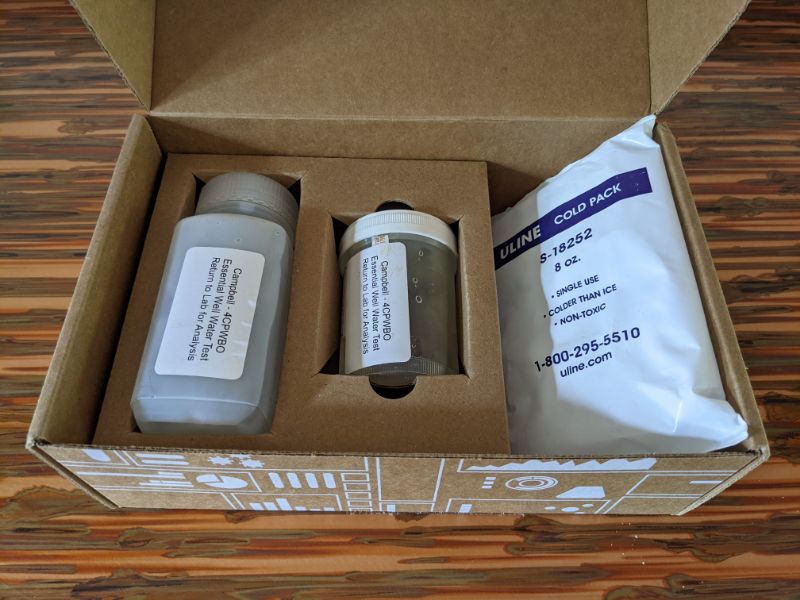Testing your drinking water quality is the best way to find out exactly what it contains.
Even treated municipal water supplies often contain trace levels of potentially harmful contaminants, and these are typically undetectable by taste, sight, or smell. That’s where water testing comes in.
Our water treatment experts have experimented with every method of water testing to bring you this guide to our top recommended methods of testing your drinking water quality at home.

Table of Contents
🧪 Use a DIY Water Test Kit
What can you test for?
- Lead
- Hardness
- pH
- Fluoride
- Copper
- Iron
- Total/ free chlorine
- Nitrate
- Nitrite
- Zinc
- Sulfate
- Mercury
- Total alkalinity
- Hydrogen sulfide
- Sodium chloride
- Manganese
- Total coliform bacteria
A DIY water testing kit is the fastest method to test your home’s drinking water, but it can only be used to detect certain contaminants.

Most DIY water testing kits contain test strips and a color wheel or chart.
Here’s how to test your water using a DIY water test kit:
- Take a drinking water sample from your faucet in a clean cup or container
- Unbox your home test kit and dip a test strip into the water
- Wait for the squares on the test strip to change color
- Compare these colors to the color wheel/chart
The color of the squares on the strip indicates the concentration range for each contaminant that you’re testing for, typically in PPM (parts per million).
Note: if you want to test for bacteria, you can add a few drops of water to a special kit containing powder. When you shake the container, the water will change color.
Read Our In-Depth Reviews:
🚰 Buy a Certified Lab Test
What can you test for?
- Heavy metals
- Arsenic
- Phosphate
- Minerals
- PFAS
- Radiologicals (e.g. radon)
- VOCs
- Biological contaminants (coliform bacteria, viruses, cysts, algae, etc.)
- Disinfection byproducts
- Inorganics
- Dissolved gases
- Suspended particles
- Microplastics
- Hardness
- Alkalinity
- pH
- Turbidity

Certified laboratory training is the most accurate drinking water quality testing method. There are lab tests for even the most complex and specific contaminants, including radiologicals, pathogens, and microplastics.
Unlike DIY testing, certified lab testing doesn’t deliver instant results. Typically, it takes 7-10 days to receive your results, depending on what you’re testing for.
You can buy a laboratory tap water test that detects one particular contaminant of concern or several impurities together. A lab test report will usually tell you not only exactly what your water contains, but the quantities of these contaminants and how they compare to their individual public health regulations.

To get your water tested by a lab, follow these steps:
- Purchase your lab water quality testing kit of choice
- Wait for the sample kit to be posted to your home
- Follow the instructions in the kit to take your water samples
- Ship the samples back to the lab (most labs provide a free shipping return label)
- Wait for your results to be delivered via email – this could take 7+ days, depending on the complexity of the testing method required
Go for an Environmental Protection Agency-certified lab that uses reliable, accurate testing processes. We recommend Tap Score tests by SimpleLab for lab testing. Results are delivered in a comprehensive interactive report and the choice of test kits is broader than any other lab testing company we’ve found.

📇 Use a Digital Water Tester
What can you test for?
- Total dissolved solids (TDS)
- Total organic carbon (TOC)
- Chemical oxygen demand (COD)
- Water temperature
- pH
- Electrical conductivity (EC)
Digital water testers can test for a few select water parameters and quality indicators, including TDS, pH, and water temperature.
While digital water testers can give an indication of water quality, they don’t serve as a direct method to test your water quality because they don’t tell you what contaminants your water contains.
A high TDS reading also doesn’t automatically mean that your water quality is poor. Certain dissolved solids, like hardness, don’t have health risks when ingested in drinking water. But if your water’s TDS is unusually high, you can then conduct further testing for specific contaminants to find out the cause.
TOC and COD, which certain digital water meters detect, indicate water quality because they reflect organic matter present in the water supply. TOC is particularly useful to know for well owners who plan to chlorinate their water, since organic matter reacts with chlorine to form disinfection byproducts.
Some people use digital water testers after installing a reverse osmosis filtration system to check that it’s working properly. (RO systems greatly reduce dissolved solids in water.)
To use a digital water tester to test your water, follow these steps:
- Collect a sample of cold tap water in a clean container or cup
- Follow the instructions on the box for calibrating the digital reader
- Submerge the end of the meter (around half an inch or so) into the water
- Read the numbers on the display
Related: How to test pH of water without strips or a kit
🔎 How to Test Your Water Quality Accurately
To ensure your water quality test results are accurate, you need to follow the exact testing or sample-taking procedure outlined in the instructions.
Here are our top tips to increase the accuracy of your water testing:
- Read and follow the instructions carefully
- Wash your hands before you get started
- Don’t touch the inside of containers/vials that you’re using to collect water
- Wait until you’re ready before opening the testing strips/sample kit
- Pour carefully
- Time the process with a timer (for DIY test kits)
- Take a cold water sample, not hot
If you’re using a DIY test kit that detects high concentrations of a dangerous contaminant, like lead, we strongly recommend following up with professional testing from a laboratory. In the meantime, switch to bottled water or boil your water (if microbiological contaminants are detected) to make it safe to drink.
📝 Interpreting Your Test Results
Once you have your test results, you can determine:
- Which contaminants have been detected in your water
- How the concentrations of these contaminants compare to health guidelines/legal limits
- How the concentrations of these contaminants compare to the recorded concentrations in your water utility’s Consumer Confidence Report
- Whether or not you want to test again for a specific contaminant
- Whether or not you want to take action (such as installing a water filter) to address your water quality issues
If you want to know whether certain contaminants have been detected in potentially health-harmful concentrations in your water, you can compare your test data with the EPA’s National Primary Drinking Water Regulations for these contaminants, established under the Safe Drinking Water Act (SDWA).
But the EPA only regulates common contaminants with known health effects, and some emerging contaminants currently aren’t regulated. Plus, many organizations, like the EWG, argue that the EPA’s legal restrictions are too lenient.
With this in mind, you might want to compare your test data to different guidelines for water quality. For instance, when we use Tap Score lab tests, we compare our data to Tap Score’s own Health Guideline Levels (HGLs), which are much stricter than the EPA’s MCLs and prioritize human health.
You might decide that you want to remove certain contaminants from your water supply with an at-home water filter. Read our definitive guide on water filtration systems to find out which type of system is best for your needs.
💯 Compare the Best Home Water Test Kits
 Tap Score by SimpleLab |  National Testing Laboratories |  Safe Home ULTIMATE |  Health Metric Drinking Water Test Kit |  Watersafe Drinking Water Test Kit |  Test Assured Drinking Water Test Kit |  Hach Total Hardness Water Test Strips |
|
|---|---|---|---|---|---|---|---|
| Type | Lab Test | Lab Test | Lab Test | Test Strips | Test Strips | Test Strips | Test Strips |
| Rating | 5/5 | 4.5/5 | 4.5/5 | 4/5 | 4/5 | 4/5 | 4/5 |
| Analytes Tested | 200+ | 75 | 200 | 9 | 10 | 10 | 1 |
| Turnaround Time | 5 business days | 10-15 business days | 7-10 business days | 10 minutes | 10 minutes | 10 minutes | 10 minutes |
| Learn More |
